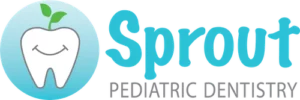Growth and Development
Did you know that what your child does every day can affect how their facial and jaw structures develop? While innocent habits like thumb sucking might seem harmless enough, over time, they can cause severe issues in the way your child’s smile grows.
Here is a brief timeline for the growth of your child’s facial and jaw structures:
- Your child’s face has developed more than 60% by age four.
- Your child’s face has developed more than 70% by age five.
- By age 12, your child’s face is more than 90% developed.
Dr. Amanda will be tracking the growth and development of your child’s face, making sure that it meets essential criteria that come with age. She will also ask questions about habits that can cause developmental harm and future oral health problems.
Here is a list of habits Dr. Amanda is looking for:
- Thumb Sucking
- Bottles
- Pacifiers
- Mouth Breathing
- Soft Food Diet
- Tongue Thrusting
- Oral Dysfunction
Dr. Amanda and the Sprout Team will discuss these issues with you and your child before they become a habit that is hard to reverse. We have simple protocols and explanations that children can understand to make an early effort to turn these development issues around.
Mouth Breathing
Mouth breathing can drastically affect your child’s facial development. The nose is designed for breathing, while the mouth’s primary purpose is to eat and drink. Children who mouth breathe don’t get enough oxygen, which leads to airway development issues. If these problems persist, your child will start to have sleep disorders.
Problems sleep disorders cause:
- Snoring
- Bedwetting
- Tossing and Turning
- Grinding the Teeth
- Learning Difficulties in School (ADHD, ADD)
- Irritable Behavior
- Cardiovascular Effects
- Obesity
- Daytime Sleepiness
- Signs and Symptoms of Underdeveloped Arches
A child with underdeveloped arches has to seek these treatments to correct the problem:
- Myo Munchee
- Myobrace
- Orthodontic Appliances
- Myofunctional Therapy
- Other Orthodontic Modalities
- Referral to Other Allied Health Professionals
- ENT Referral

